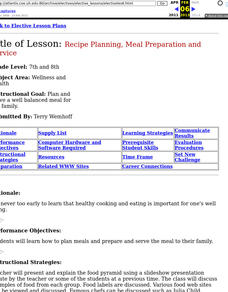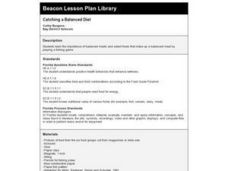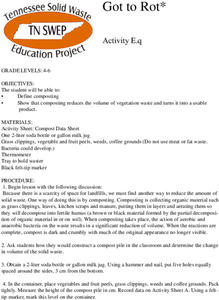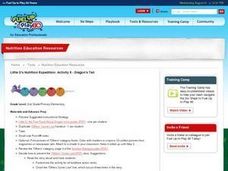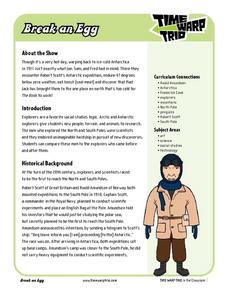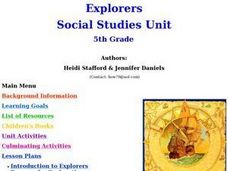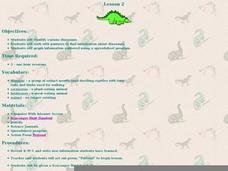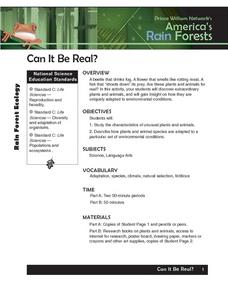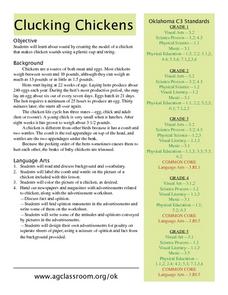Curated OER
What Were Dinosaurs Like?
Students compare and contrast dinosaurs to animals that are alive today through basic research.
Curated OER
Recipe Planning, Meal Preparation and Service
Students examine how to plan, prepare, and serve a meal. They analyze the food pyramid, select five recipes, plan a dinner menu, create a HyperCard stack of the menu, and prepare the meal for their family.
Curated OER
Food Pyramid
Second graders complete variety of activities to explore the Food Pyramid and the importance of eating a variety of healthy foods.
Curated OER
Introduction to the Food Pyramid
Students review information on the food pyramid, either in printed works or on the Internet, to research healthy eating habits.
Beacon Learning Center
Catching a Balanced Diet
First graders explore the importance of balanced meals. They play a fishing game to help them select foods to make up a balanced meal.
Curated OER
Life And Death
Students participate in an interactive game to review how living things are classified.
Curated OER
Magnets: They Are Totally Attractive
Students classify objects that magnets are attracted to and aren't attracted to. They also magnetize metal. They construct and use a compass. They develop a product which show they explain the properties of magnetism.
Curated OER
Got to Rot
Learners make their own compost in a 2-liter jug and determine the actual volume loss in the composted material over a six-month period.
Curated OER
DNA Extraction From Onion
Young scholars extract DNA from an onion using household equipment and supplies.
Curated OER
The Dragon's Tail
Second graders read a story about Little D, a baby dragon, and how he interacts with the five food groups. They color, chant, pantomime, and discuss food groups after reading the story. They also consider causes and effects as they make...
Curated OER
Food Chains
Fourth graders study food chains, producers, consumers, and decomposers. They play a food chain game and create food chain mobiles or posters. They take a nature hike around the school and observe various parts of a food chain.
Curated OER
A Dog's Life
Students get a look into the life of dogs-from their origins and basic biology, through selective breeding, and into how dogs have become intricate parts of everyday life for many people worldwide.
Curated OER
Break an Egg
Young scholars research antarctic wildlife and create a diorama and fact sheet to present their research to the class. They create an Antarctic explorer's journal.
Curated OER
The Raven: Creator of the Universe?
Learners conduct research to learn about the fascinating ways and lore of the raven. They analyze the variety of ways the raven has been perceived by different cultures and classify the information and create a convincing argument to...
Curated OER
The Red Kangaroo: An Outback Survivor
Students watch an episode of "Nature" about the "Big Red Roos." They create food chains and webs based on the information they've researched on the red kangaroos. They write an editorial on the topic of the killing of kangaroos in the...
Curated OER
Explorers Unit
Fifth graders complete a unit on early explorers. They develop a timeline, sing a Viking song, watch a video, compile a checklist of supplies needed for an expedition, participate in a scavenger hunt, write a letter from Christopher...
Curated OER
Dinosaur Scavenger Hunt
Students conduct research on dinosaurs and graph the information gathered using a spreadsheet program. In pairs they complete an Internet scavenger hunt, and record five facts about dinosaurs in their science journal.
Curated OER
America's Rain Forests Can It Be Real?
Students examine the attributes of unusual plants and animals before determining how they are adapted to specific habitat. They complete an associated worksheet. They make posters with information that they find during research sessions.
Curated OER
Food Web Mobile
Students explain the main concepts of food webs and food chains. They
describe the role of animals, plants, and other organisms in cycling energy and matter through a food web by creating mobiles. Lesson contains adaptations for all levels.
Curated OER
The Fable of Franny And Her Fabulous Fainting Goat
Mix the art of reading comprehension with the skill of telling time. Children in grades two and three will discuss the importance of goats throughout history based on the provided background information. They'll create cute goat clocks...
Curated OER
Snack Sack
First graders, after exploring agricultural products that can be considered snack foods, experience the concepts of ratio and probability. They analyze and record their class experience after dealing with the following snacks: peanut...
Curated OER
Clucking Chickens
A comb, wattle, and beak are three characteristics that describe a chicken. Your class can explore the life of a chicken through reading, art, movement, and music. Using a plastic cup and string, they'll create a pretend chicken that...
Alabama Learning Exchange
Classification
Students examine why scientists classify living organisms. They list and classify items they buy at the grocery store, sort and classify leaves, explore various websites, and write a biography of Carolus Linnaeus.
Curated OER
Consumer Education
Students, while examining an intense list of vocabulary terms on types of money, change and simple foods, name and state the cost of food items in supermarkets, grocery stores and flea markets with flash cards and newspaper ads.
Other popular searches
- Meat Group
- Food Preparation Meat
- Meat Food Labels
- Meat Cuts
- Beef Meat Cuts
- Food Group Meats
- Beef Cattle Meat Cuts
- Meat Food Group
- Food, Meat Group
- Meat Pie
- Raw Meat
- Meat and Poultry



